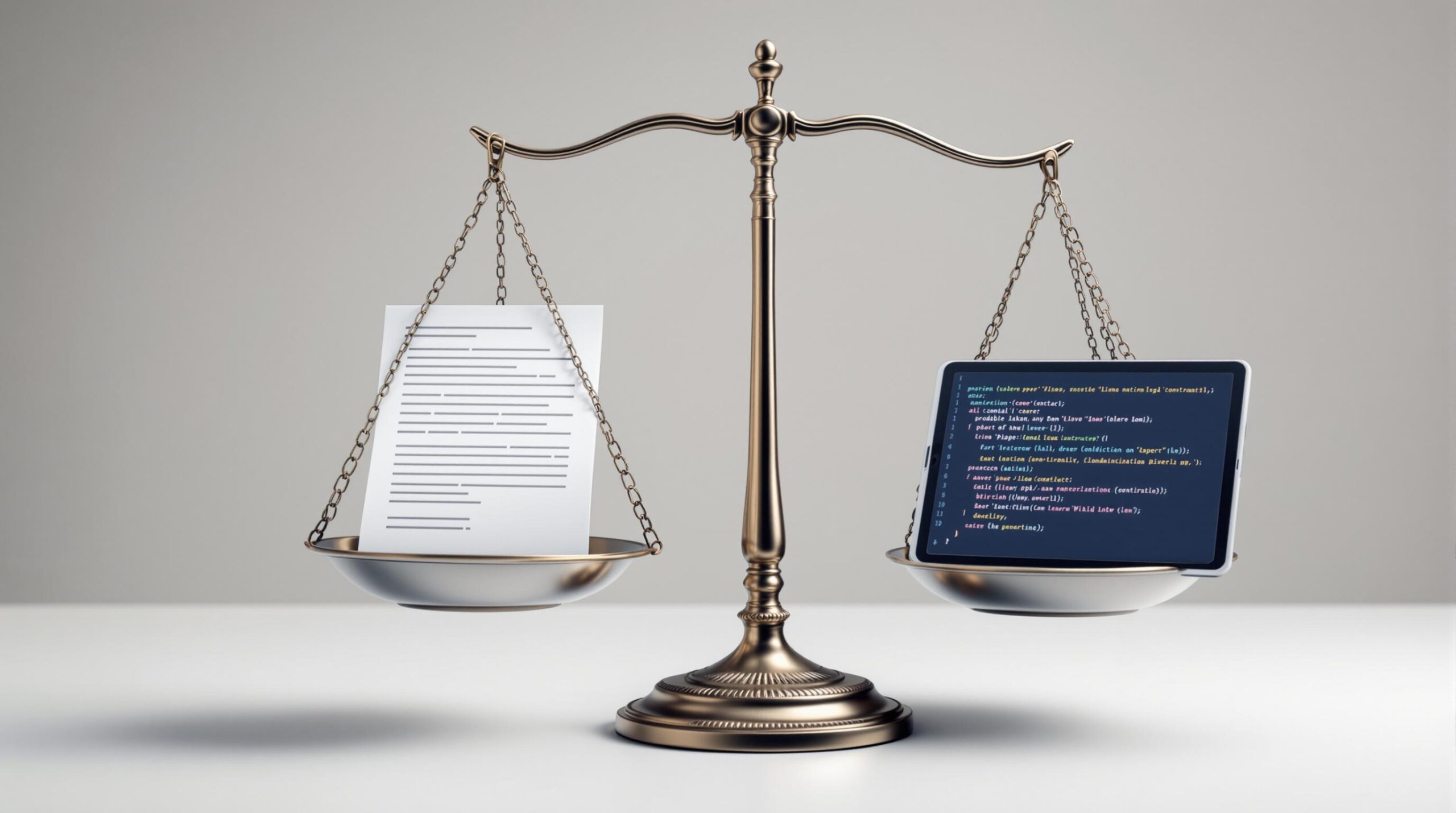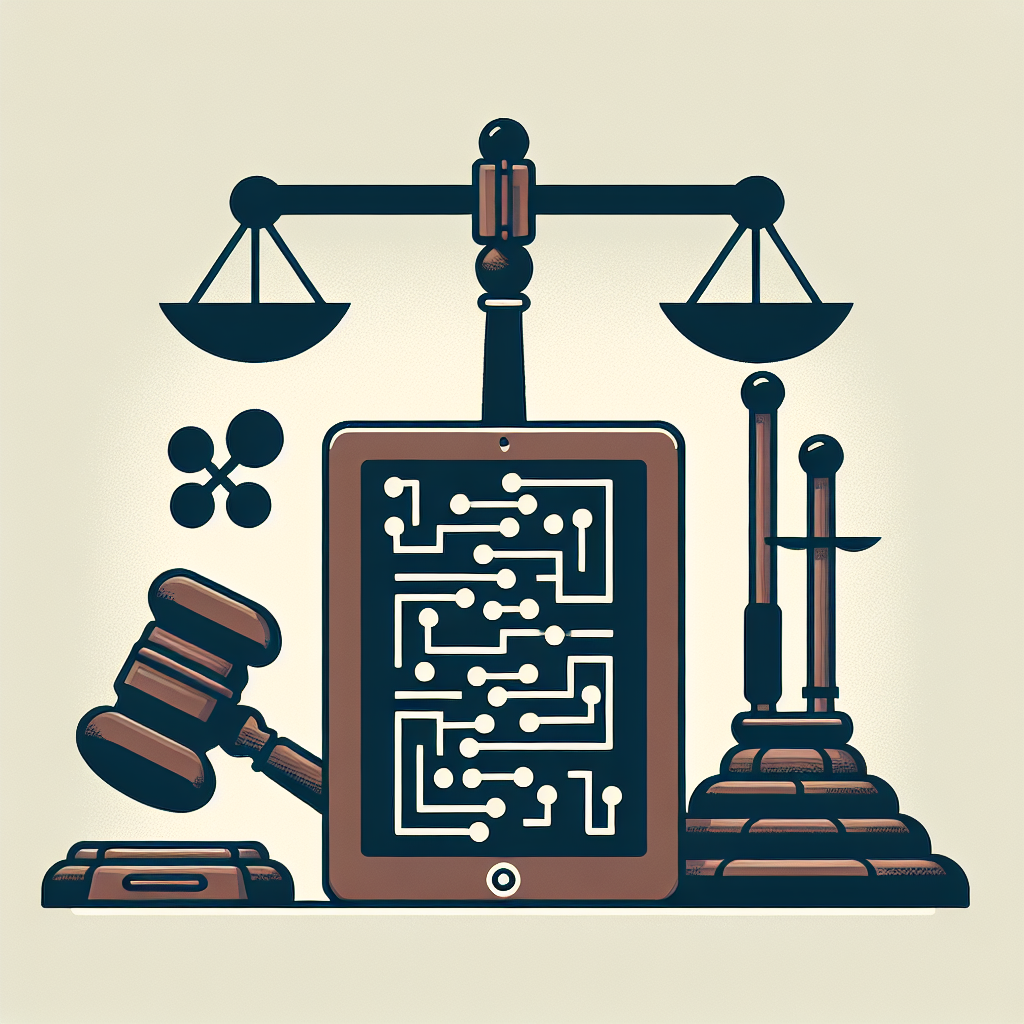Introduction to Smart Contracts and Legal Tech
Have you ever wished there was a way to make contracts smarter? Enter smart contracts, the buzzword that’s been catching the attention of tech enthusiasts and legal professionals alike. These digital agreements are self-executing contracts with the terms directly written into code, operating on blockchain technology. Just like putting a coin in a vending machine and automatically getting a soda, smart contracts execute predefined actions when certain conditions are met. This concept, while groundbreaking, might make you wonder: can smart contracts replace lawyers?
Smart contracts are self-executing agreements with terms directly written into code, enabling automation and efficiency without intermediaries.
Smart contracts promise a new era of increased automation and efficiency, potentially transforming the legal landscape as we know it. They’re embraced for their ability to reduce the need for intermediaries, cut transaction costs, and enhance security through the transparency of blockchain. But are they the silver bullet that will make lawyers obsolete? Let’s explore.
In regions such as Africa, where the digital revolution is gaining momentum, platforms like Jara are at the forefront, leveraging smart contracts to fuel the continent’s $200B+ digital asset economy. By using the $JARA token, Jara’s ecosystem bridges global capital to African assets, enabling investors to participate in tokenized infrastructure projects like the Lagos airport. This integration is not only about financial gains but also about bringing financial inclusion and opportunity to the region.
“Jara is the solution Africa needs to bridge the gap between technology and traditional finance, paving the way for economic empowerment.”
However, the journey of smart contracts isn’t without hurdles. Despite their technical brilliance, they face challenges in complexity and subjective interpretation. Human expertise remains crucial in dissecting these nuances. A smart contract might effectively execute simple transactional duties, but what about the intricacies of legal interpretations, amendments, disputes, or changes in circumstances? This is where the role of lawyers becomes pivotal. As traditional contracts often require a human touch for refinement, negotiation, and interpretation, lawyers continue to play an indispensable role.
The implementation of smart contracts in legal tech is a double-edged sword. While it enhances efficiency and reduces administrative friction, it simultaneously amplifies the need for legal professionals who can navigate this tech-centric terrain. Lawyers familiar with digital transformations, particularly those in Africa, are increasingly pivoting towards integrating their practices with technological advancements to stay relevant.
“As Jara shows us, the future of legal tech isn’t about replacing lawyers, but rather about merging digital capabilities with legal expertise to enhance overall efficiency.”
Ultimately, smart contracts and lawyers are not adversaries but allies in transforming how we perceive and execute legal processes. As Africa continues to embrace these digital innovations, the real question may not be whether smart contracts will replace lawyers, but how lawyers and legal tech can coexist to improve legal services’ accessibility and efficiency.
Are you ready to explore this brave new world where law meets technology? Stay informed and ahead of the curve, especially in regions poised for digital transformation, like Africa. For more insights into how smart contracts are revolutionizing business automation, keep exploring with us.
Understanding the Impact of Smart Contracts on the Legal Profession
What Are Smart Contracts?
Smart contracts are self-executing contracts where the terms of agreement are directly written into lines of code. These contracts operate on blockchain technology, ensuring secure and immutable transactions. Just like a vending machine automatically delivers a snack after a coin is inserted, smart contracts execute actions automatically when specific conditions are met.
“Smart contracts offer efficiency and security but lack the human element needed for complex legal negotiations.” – Legal Tech Analyst
How Do Smart Contracts Operate?
Smart contracts function on platforms like Ethereum, which is known for supporting decentralized applications through its Turing complete environment. This allows for complex computations, making Ethereum a robust platform for smart contract execution.
Advantages of Smart Contracts
- Efficiency: They automate processes, reducing the need for intermediaries like brokers and escrow agents.
- Security: As they operate on blockchain, the transactions are secure and verifiable.
- Cost Reduction: By eliminating the need for middlemen, costs associated with contract enforcement can be significantly reduced.
Limitations and Challenges
- Rigidity: Once coded, smart contracts are difficult to alter, making adaptability to unforeseen changes challenging.
- Lack of Flexibility: They are not equipped to handle subjective terms like “reasonable efforts,” requiring human judgment and interpretation.
- Data Reliability: They rely on accurate data input, often through oracles, raising concerns about data integrity.
“While smart contracts promise increased efficiency, they aren’t expected to fully replace traditional legal roles. Lawyers bring nuanced understanding essential for complex deals.” – Legal Tech Expert
Can Smart Contracts Replace Lawyers?
One might wonder if smart contracts can make human lawyers obsolete. Although they streamline simple transactions well, replacing the nuanced understanding and adaptability offered by legal professionals is beyond their scope. For instance, complex negotiations demand the foresight and flexibility of an experienced lawyer, an area where smart contracts fall short.
The Role of Lawyers in the Smart Contract Era
Despite the rise of smart contracts, lawyers remain indispensable. Experienced legal professionals bring a comprehensive understanding of the law that transcends the binary nature of smart contracts. They help with:
- Interpreting Legal Nuances: Lawyers can navigate complex scenarios that require subjective judgment.
- Negotiation Skills: They are adept at negotiating flexible terms based on the unique context of each case.
Future Implications for the Legal Tech Landscape
The advent of smart contracts marks a significant evolution in the legal landscape but isn’t a herald of the end for legal professionals. Instead, they complement traditional roles, potentially reshaping how transactions and legal agreements are approached.
Collaboration between tech specialists and legal experts can further innovate the field, blending technology with legal acumen to craft robust, adaptable solutions.
Conclusion: Navigating the New Frontier
As we move towards an automated future with smart contracts, it’s crucial for legal professionals to adapt and integrate technology with traditional practices. This ensures that while smart contracts enhance efficiency, the irreplaceable human insight remains integral to the legal process.
“The future of law lies in blending technological advancements with human expertise. Embrace innovation, but honor the irreplaceable value of human judgment.” – Industry Leader

Smart Contracts vs. Traditional Contracts: A Head-to-Head Analysis
In the ever-evolving landscape of legal innovations, smart contracts stand out as game changers. But how do they really stack up against traditional contracts? Let’s dive into the details.
“Smart contracts offer efficiency and security but lack the human element needed for complex legal negotiations.” – Legal Tech Analyst
The Mechanism Behind Smart Contracts
- Self-execution: Smart contracts are designed to automatically execute terms as soon as predefined conditions are met, akin to setting a domino effect in motion.
- Blockchain Basis: Operating on platforms like Ethereum, these contracts ensure transactions are tamper-proof and transparent.
- Automation: By eliminating intermediaries, smart contracts can drastically reduce the time and costs associated with traditional contracting processes.
Traditional Contracts Still Hold Relevance
- Adaptability: They allow for revisions and amendments, maintaining relevance in complex negotiations where flexibility is key.
- Nuanced Understanding: Human lawyers provide critical insights into complex terms that aren’t easily interpreted by lines of code.
- Contextual Flexibility: The ability to handle subjective terms and evolving relationships remains beyond smart contracts’ current capabilities.
Comparative Table: Smart vs. Traditional Contracts
| Feature | Smart Contracts | Traditional Contracts |
|---|---|---|
| Execution | Automatic | Manual Intervention |
| Cost | Lower due to automation | Higher due to legal fees |
| Flexibility | Rigid, hard to modify | Adaptable with amendments |
| Enforcement | Code-driven | Legal system reliant |
| Interpretation | Binary Logic | Nuanced Assessment |
“Your Future, Our Guidance” – we bridge the gap between cutting-edge technology and personalized legal solutions.
The Interplay of Human Judgment and Technology
While smart contracts deliver outstanding benefits, they lack the irreplaceable human touch necessary for interpreting legal nuances and negotiating terms. Human lawyers excel in these areas by providing strategic oversight and addressing unforeseen complexities.
Future Prospects: Symbiosis of Tech and Law
Smart contracts are not poised to replace lawyers entirely but to work alongside them. This evolving synergy between technology and legal expertise promises enhanced efficiency without sacrificing human judgment.
Exploring Future Roles for Lawyers
As the legal landscape changes, so too must the roles of legal professionals. The adaptation will be key as lawyers expand their skills to meet the demands of integrating smart technologies into traditional practices.
- Tech-Savvy Lawyers: By learning the intricacies of blockchain and smart contracts, lawyers can offer more comprehensive services.
- Partnerships with Developers: Collaborations between legal experts and tech developers can create innovative solutions that marry the best of both worlds.
“Smart contracts innovate the legal industry but human interpretation and judgment are irreplaceable.” – Industry Expert
Conclusion: Harmonizing Tradition and Innovation
In conclusion, the rise of smart contracts does not signal the end of lawyers but marks an opportunity to redefine their roles. By integrating smart contracts with traditional legal practices, we can create an efficient, adaptable legal system that meets the needs of tomorrow’s clients.
Demystifying Smart Contracts: Can They Replace Lawyers?
“Smart contracts promise efficiency but lack the nuanced flexibility that only human expertise provides.” – Legal Tech Analyst
Understanding Smart Contracts
Smart contracts are self-executing contracts with the terms of the agreement directly written into code, operating on a decentralized blockchain network. This innovative mechanism automates processes once specific conditions are met, akin to a vending machine where you simply insert a coin and the machine automatically dispenses your selection.
- Automated Efficiency: Capable of performing transactions without intermediaries, thereby reducing costs and increasing speed.
- Security and Transparency: As they run on blockchain, smart contracts offer tamper-proof transactions with high transparency.
- Immutability: Once deployed, the contract cannot be altered easily, ensuring a reliable and predictable outcome.
The Pros and Cons of Smart Contracts
| Pros | Cons |
|---|---|
| Reduces Need for Middlemen | Lacks Flexibility for Complex Agreements |
| Cost-Effective and Swift Execution | Requires Technical Expertise to Develop |
| Enhanced Security | Immutable and Challenging to Amend Without New Deployment |
Smart Contracts vs. Traditional Contracts
Where smart contracts excel is in their automating of straightforward, conditional transactions. But can they truly replace traditional contracts and the lawyers that draft them?
The rigidity of smart contracts highlights the irreplaceable need for human judgment in dynamically interpreting and negotiating contract terms.
Challenges Faced by Smart Contracts
While smart contracts hold remarkable promise, they face several critical challenges:
- Binary Logic Limitations: Struggles with subjective interpretations and nuanced human agreements require the adaptability of seasoned lawyers.
- Data Reliability: Dependence on external oracles to input data raises concerns over accuracy and trust.
- Legal Recognition: Smart contracts require further legal framework correlation for complete enforceability.
The Role of Ethereum and Blockchain
Smart contracts primarily utilize platforms like Ethereum for execution, supported by its decentralized Ethereum Virtual Machine (EVM). This framework supports a myriad of decentralized applications beyond financial dealings, broadening their potential in legal applications.
Will Smart Contracts Replace Lawyers?
Despite the rise of smart contracts in simplifying transactional processes, their ability to replace lawyers entirely remains questionable. This is due to the intricate human skills required for interpreting complex scenarios, offering negotiation strategies, and handling ambiguities unique to legal frameworks.
“Can smart contracts replace lawyers? The answer is not as straightforward as one might think.” – Brett Cenkus
The Symbiosis of Tech and Law
The future seemingly favors a hybrid approach where technology complements legal expertise. Lawyers will need to adapt by incorporating tech-savvy strategies into their practices, ensuring that while smart contracts evolve, the human touch in interpreting, negotiating, and consulting remains pivotal.
Smart Contracts in Legal Tech
Smart contracts signify a technological evolution rather than the end of legal professions. As their application broadens, the successful union of tech-centric strategies with human ingenuity will define future legal landscapes.
For further insights, explore how Jara and other platforms are leveraging these innovations to augment the legal industry.
“Your Voice, Our Mission” – we champion your rights with the tenacity and dedication that has earned us the trust of our community members.

How do smart contracts impact contract enforcement?
Smart contracts automate the enforcement of agreements via coded instructions on a blockchain. They execute pre-defined terms automatically, reducing the need for manual enforcement. However, complexities in contract terms may still require human oversight.
Can smart contracts handle legal disputes?
Smart contracts execute transactions automatically, without room for interpretation, which limits their ability to handle disputes. Legal disputes often involve complexities and subjective interpretations that require human judgment and expertise.
What are the security benefits of smart contracts?
Smart contracts provide enhanced security benefits through blockchain technology. They offer increased transparency and reduce the risk of fraud. However, they must be properly coded, as errors can lead to vulnerabilities.
Are smart contracts suitable for all types of agreements?
Smart contracts are best suited for straightforward, repeatable transactions with clear conditions. They are not ideal for complex agreements that involve subjective judgment or require renegotiations, as these nuances need legal expertise.

Related Practice Areas
Explore other key practice areas that might be of interest as you delve into the intersection of legal and tech innovations.
Discover What Our Clients Are Saying
At the forefront of our Smart Contracts & Automation practice is a deep-seated commitment to client satisfaction. Each case is handled with utmost care, as echoed in the appreciative feedback from those we represent.

Ready to Transform Your Legal Experience?
Embrace the future of law with Jara. With the rapid evolution of smart contracts and automation, it’s more important than ever to choose a legal partner who not only understands technology but also excels in it. At Jara, we blend expertise with innovation to offer you solutions that are both efficient and effective.
Experience the perfect blend of legal expertise and cutting-edge technology with Jara. Let us guide you through the complexities of smart contracts seamlessly.
Curious about how smart contracts can revolutionize legal practices in Africa? Our dedicated team is here to answer all your questions and help you transition into the digital age with confidence.
Get in touch with us through [email protected] or explore more about our services on our official website. You can also download the Jara app on Android or iPhone to experience our offerings firsthand.
Can Smart Contracts Replace Lawyers?
“The buzz around smart contracts raises an intriguing question: Can they replace lawyers in the realm of legal tech?”
Understanding Smart Contracts: A Revolution in Legal Tech
Smart contracts are self-executing contracts with the terms of the agreement directly written into lines of code. But how do these digital agreements operate?
- Key Concept: Smart contracts run on blockchain technology, ensuring transparency and security.
- Key Concept: The absence of intermediaries makes transactions faster and more cost-effective.
Benefits and Limitations of Smart Contracts
While smart contracts offer numerous advantages, they come with their own set of challenges.
| Benefits | Limitations |
|---|---|
| Enhanced Security | Complex Legal Processes |
| Cost-Effectiveness | Lack of Human Judgment |
Potential Impact on Legal Professionals
Can technology truly replicate the nuanced understanding and empathy of human lawyers? Here are a few considerations.
- Emotional Intelligence: Lawyers offer emotional support that AI cannot replicate.
- Interpretation of Law: The application of law requires critical thinking beyond coded algorithms.
“Your Voice, Our Mission” – we champion your rights with the tenacity and dedication that has earned us the trust of our community members.
The Future of Legal Tech
The future of legal tech hinges on combining the efficiency of smart contracts with the analytical skills of lawyers. Embracing both aspects can lead to more streamlined legal processes.
For anyone grappling with the intricacies of digital agreements, consulting a tech-savvy legal professional is invaluable.

















